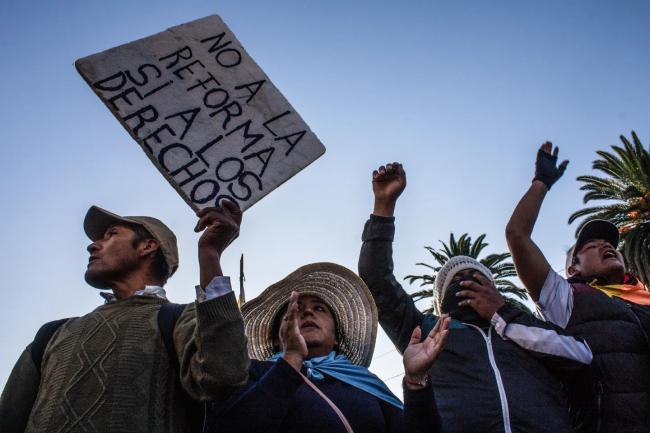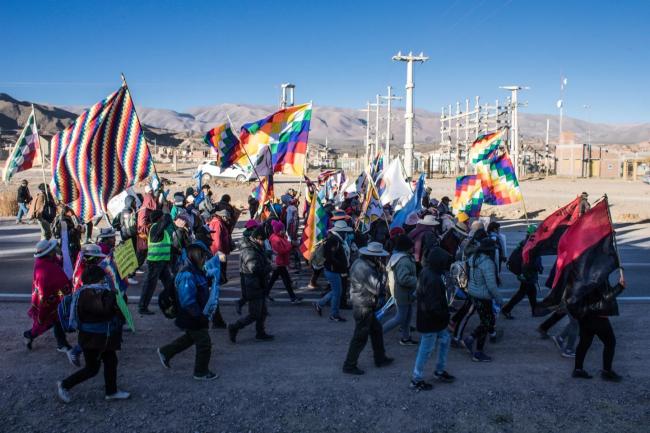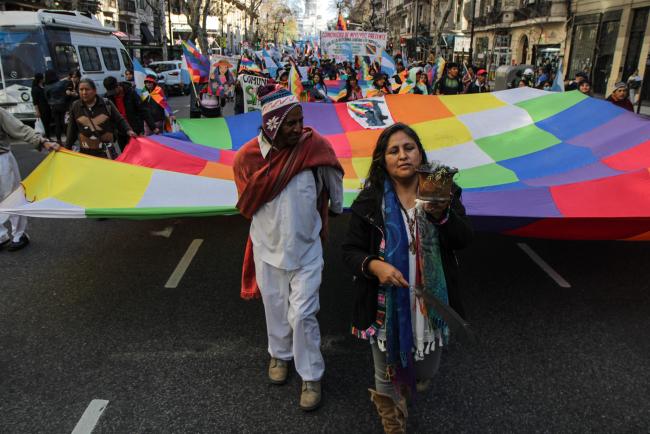
It is just past dawn in the Andean heights near La Quiaca, where the northern Argentinean province of Jujuy meets the border of Bolivia. A few dozen makeshift shelters surround a short stretch of Route 9, one of the many points where local communities decided to build a permanent roadblock. Hanging signs read “Down with the reform” and “Morales dictator,” referring to the provincial governor Gerardo Morales. Among swirls of smoke from a cookfire, a group of Indigenous women are running the action. “We no longer stay silent, we no longer stay at home. We go out and fight against Morales’s government and his reform, supporting the [Indigenous] communities, the poor and working-class people,” says one of the women.
The widely unpopular constitutional reforms, propelled by Morales of the conservative Radical Civic Union (UCR) party and formally enacted on June 20, not only increased the concentration of power in the governor's hands, but also restricted the right to protest and opened the door for further encroachment of extractive activities onto land historically occupied by Indigenous communities. Faced with widespread opposition, Morales engaged in vicious repression: while the reform was being voted on inside Jujuy’s legislature building, teachers and other demonstrators were teargassed, chased down, and battered with rocks and rubber bullets. “They aimed at your eyes, it’s the Chilean school” said a protestor according to a report by Revista Anfibia, referring to the Chilean police’s violent and systematic blinding of protesters during the country’s 2019 popular uprising.
This struggle has obvious implications for neighboring countries—such as Brazil, Bolivia, and Peru—that are facing a new wave of extractivism fueled by an incipient global transition to renewable energies. In the midst of this conflict, Morales announced his candidacy for vice-president, accompanying presidential candidate Horacio Rodriguez Larreta on the center-right Juntos por el Cambio (Together for Change, JxC) ticket. His leading rival, Sergio Massa from the Peronist coalition Union por la Patria, is a known supporter of mining and other extractive activities. Regardless of who wins, this conflict is a harbinger of what awaits Argentina leading up to the country’s general elections on October 22.
A Stolen Land
Jujuy is one of Argentina’s poorest provinces, with a high percentage of its population of Indigenous descent. The Indigenous peoples in the province—including the Kolla, Atacameño, Omaguaca, and Guaraní—have learned to survive and build community despite the hostility of landed elites and neglect from local and national governments. Indigenous communities have been stripped of land and resources, repressed, and discriminated against since the arrival of Spanish settlers in the 16th century, and have been historically submitted to abusive conditions as farm workers or tenant farmers for large landowners. Working conditions on 20th century sugar plantations—such as the sugar mill Ingenio Ledesma, later incorporated as an agribusiness and manufacturing firm—were infamously oppressive. According to local residents, that continues to be the case today.
Since the beginning of the 20th century, Indigenous communities in Jujuy and other provinces have turned to political organizing and mobilization to defend their land rights. In the 1980s and 1990s, a reemergence of Indigenous activism succeeded in winning recognition and certain key rights. The 1994 National Constitution included a provision explicitly recognizing Indigenous peoples, guaranteeing respect for their identity and right to bilingual education, as well as protecting collective land ownership of territory that was historically occupied and the potential concession of more land as needed. This land was “not to be sold, taxed, or embargoed” and Indigenous communities were granted the right to participate in any decision affecting their land and its resources. In 2000, the Argentinian state ratified the International Labor Organization’s (ILO) Convention 169, which clearly states that Indigenous peoples must be consulted “whenever consideration is being given to their capacity to alienate their lands or otherwise transmit their rights outside their own community.” Morales’s reform process did not include any meaningful consultation with Indigenous communities and violated principles established by the 1994 constitution and the ILO’s Convention.
The global fever for lithium set off by the burgeoning electric vehicle industry has made matters even worse, turning much of the province of Jujuy into a boon for multinational mining companies. Large amounts of water are needed for lithium extraction, performed primarily in salt flats such as the Salinas Grandes and desert-like ecosystems, such as Jujuy’s Quebrada de Humahuaca.
Morales’s Reform
Governor Morales undertook a reform to the constitution of the Province of Jujuy, including a provision paving the way for further penetration of mining industries and restricting the right to protest. In the face of massive opposition, Morales backtracked on two articles concerning private property and the ability of the provincial government to declare certain lands and resources of “public utility,” which was widely seen as an attempt to bypass Indigenous communities’ right to their territory. He also scrapped a provision—also widely resisted—that would have eliminated midterm elections and given any elected governor an automatic majority in the provincial legislature.
Yet, the final reform, enacted on June 20 with the support of Morales’s UCR party and representatives of the Peronist party Partido Justicialista (PJ), kept the ban on roadblocks as a form of protest. This prohibition is not minor: roadblocks have long been a prominent form of struggle for Indigenous communities, unemployed workers, women’s movements, and environmental activists as the most accessible avenue for making their voices heard. Roadblocks are a primary form of protest for women organizations protesting femicides and local communities defending their land and water access.

The Resistance
For over a month, a broad coalition of teachers, Indigenous communities, miners, environmental activists, and political parties has staged mobilizations, roadblocks, and marches against the reform. The teachers went on strike first, demanding higher wages, better working conditions, and the withdrawal of the constitutional reform. The government responded with repression and threats. Perhaps fueled by this response, a resistance movement caught on immediately. In just a few days, dozens of demonstrations spread across La Quiaca, Purmamarca, Humahuaca, and other cities and towns in the interior of Jujuy. The state crackdown only intensified. At least four people lost sight in one eye due to the impact of rubber bullets, hundreds have been reported injured, and the violence employed by the police has raised concerns from the UN High Commissioner for Human Rights. Roughly a hundred people have been detained on dubious charges, including the Jujuy legislator for the Workers’ Left Front, Natalia Morales.
Today, mobilizations continue unabated. A month and a half into this conflict, a dozen permanent roadblocks across the province were still in place, teachers continued to strike—with a group of them declaring a hunger strike, and a broad alliance of Indigenous communities are resolute to fight the reform until it is rescinded. Since early June, hundreds of mobilizations in support of the struggle in Jujuy have taken place in different cities across the country, and the struggle in Jujuy has also earned international solidarity, from renowned environmental activist Greta Thunberg to Panamanian musician, actor, and activist Rubén Blades, and even filmmaker James Cameron. More recently, the Tercer Malón de la Paz (the third iteration of a March of Indigenous peoples from Jujuy) arrived to the city of Buenos Aires and camped outside the Federal Courts, demanding that the Supreme Court declare Morales’s reform unconstitutional.

Extractivism and the Lithium Triangle
The “lithium triangle,” an area spanning the territories of Argentina, Bolivia, and Chile, holds 50-85 percent of the world’s lithium deposits. Multinational mining giants such as Levint and Allkem already operate in Jujuy, and investors include the Japanese car manufacturer Toyota.
Global industry production relies heavily on extractivism, in which multinational corporations subject local communities to waste, environmental destruction, and contamination. The materials extracted are usually exported at low international prices as primary commodities, perpetuating a dependent relationship between industrialized countries producing high value-added products, and the developing, peripheral economies of the Global South.
Despite its progressive rhetoric and a social policy orientation, the recent wave of center-left governments in South America—the so-called “Pink Tide”—has not altered the reliance on extractivism for capital accumulation. In fact, much of the public policy of the first wave Pink Tide governments of the early 2000s was based on a deepening of extractive activities for the export of primary commodities such as fossil fuels, agricultural products, and minerals. Across party lines, elected officials continue offering preferential treatment, tax cuts, and other privileges to foreign capital to foster investment and attain economic growth. When market forces alone are not enough, Global North governments are ready to lobby for their corporations, cajole peripheral countries into trade agreements, and extract commitments to prioritize their companies. Elon Musk’s later deleted tweet “We will coup whoever we want!” in reference to the 2019 coup against Evo Morales in Bolivia is evidence of this, allegedly facilitating access to the country’s lithium reserves for foreign companies.
Upcoming Elections and the “Extractivist Consensus”
As this struggle in Jujuy unfolded, all major political parties announced their tickets for the upcoming presidential elections. At the head of the Peronist coalition, current Minister of Finance Sergio Massa launched his presidential campaign with a short clip explaining how the solution to Argentina’s economic woes involves selling “our lithium, our gas, our oil, [and] what our countryside produces.” As many scholars and political analysts have noted, politicians and candidates hold tightly onto a commodities consensus, or in the words of Argentine sociologist Maristella Svampa, the “large-scale export of primary goods, economic growth, and the expansion of consumption” as a strategy for development, “minimizing or paying scant attention to capital-nature relations, and to the social struggles associated with this dimension.”
In this scenario, the Workers’ Left Front - Unity coalition (FIT-U) presents a dissonant, refreshing alternative. Members of the Socialist Workers’ Party (PTS) have proposed the expropriation and nationalization of all lithium reserves under the control of workers and Indigenous communities. “It means deciding democratically on how much of this resource to extract, and using what kind of techniques,” says Gastón Remy, a PTS representative in the Jujuy legislature. Remy contends this is the only way to ensure that resources be used in harmony with the environment and life in all its forms, respecting Indigenous communities’ right to the land, and for the benefit of everyone. The current mining activity, he continues, “dictated by the market and capitalist profits, involves the use of massive amounts of water, it means environmental destruction, displacement of Indigenous communities, and precarious working conditions.”
As the struggle drags on, resistance to the reform stays strong. Indigenous women are playing a protagonist role in road blockades, saying they won’t stop until the reform is defeated. “The native peoples will keep on fighting, because we want a better future for our province and a better future for our children,” one woman told La Izquierda Diario. Alejandro Vilca, an Indigenous member of Congress from Jujuy, denounced the repression and pledged to continue the struggle, and a number of city councils in Jujuy have passed resolutions repudiating the repression and the constitutional reforms. Along the way, new forms of organization are emerging, such as the People’s Assembly, where teachers, members of the Indigenous communities, students, and environmental activists mobilize against this affront to the environmental and Indigenous and popular rights in the region.
Juan Cruz Ferre is an MD and PhD in Sociology, and a 2023-2024 postdoctoral fellow at the Program in Latin American Studies of Princeton University.

